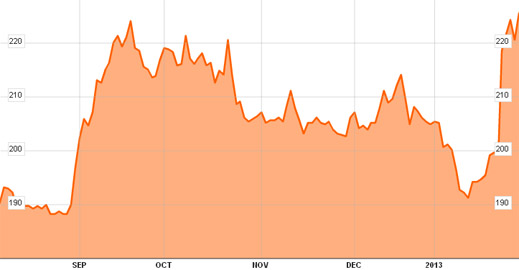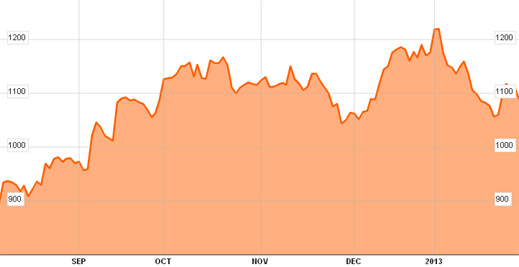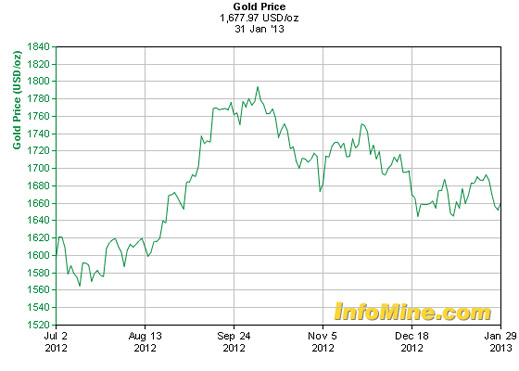
By John Helmer, Moscow
Do snaps of businessmen playing cards, or dancing the lezginka together, prove they are in a concert-party relationship which is an unauthorized way of making money, according to Rule 9 of the Takeover Code for companies listed on the London Stock Exchange — if they keep it secret from other shareholders?
Zelimkhan Mutsoev (left and centre, upper and lower images), Gavriil Yushvaev (right, right) and Suleiman Kerimov (centre, left) were all born in the Caucasus within a decade of each other. As grown-ups they have taken different career paths, and they have made large sums of money independently. Two of them, Mutsoev and Kerimov, have also acted together to take over Russia’s second potash producer Silvinit, merge it with the leader Uralkali, and create a Russian potash monopoly. The Federal Antimonopoly Service found no infraction of Russian rules in that. But if they are now trying the same thing to acquire Mikhail Prokhorov’s 38% stake in Polyus Gold, Russia’s leading goldminer, and then merge it with Polymetal, the UK rules apply because both Polyus Gold and Polymetal are premium listings on the LSE.
Acccording to the stock exchange, the premium (formerly called primary) listing ought to meet the highest standards of corporate governance, disclosure and accountability.
Polyus Gold’s lead shareholder is Kerimov with 40%. Last year he tried to raise the money to buy Prokhorov out, but came up short. On September 13 Kerimov’s holding said it was in talks to finance someone else to buy Prokhorov out. “Nafta is currently in preliminary discussions with one of the potential purchasers of Onexim’s shareholding … with a view to Nafta providing financial or other support (on terms to be agreed) to that purchaser.”
Talk like that suggests there was a concert-party group in the making. It also generated speculation that a buyout premium was in the offing, and the share price was about to go up. It did. The share price trajectories for Polyus Gold and Polymetal confirm the speculation with two price spikes – one last September, and one over this past fortnight:
6-MONTH SHARE PRICE TRAJECTORY FOR POLYUS GOLD

The September speculation added 36 pence to the share price, a 19% rise, or growth of about £1 billion for the market capitalization. This month’s speculation has added 34p per share, an 18% rise, and also another £1 billion to the market cap, which now totals £6.8 billion ($10.7 billion).
6-MONTH SHARE PRICE TRAJECTORY FOR POLYMETAL

The corresponding chart for Polymetal shows two shorter price spikes; September’s added 13%, January’s, 11%. The current market cap for the company is £4.2 billion ($6.6 billion).
Over the same six-month period, the price of gold has been heading in the opposite direction, downwards by 6.3%. The FTSE index for London listed shares is up 14.3% over the interval.

Polymetal was owned by Kerimov for eighteen months between 2006 and 2008. After he sold out, the shareholding arrangements have evolved and currently the lineup is: Kerimov’s man Alexander Mosionzhik with 4%, Alexander Mamut with 10%, Alexander Nesis with 18%, Petr Kellner’s Czech PPR group with 21%, and a free float of 47%. The only stakeholder in that group with a record of long-term investment in mining hard rock, as distinct from mining the stock market, is Nesis. If he is thinking of cashing out, leaving the Poly-Poly combination in the hands of Mutsoev, Yushvaev and Kerimov, the post-merger London market may well calculate that there will be short-term pressure to repay loans and turn shares into cash. Failing a takeoff in the price of gold, this in turn will mean a downgrade in the resale value of the assets.
If Kerimov has persuaded Mutsoev, Yushvaev and Mosionzhik to ignore the gold price for the time being, and to concentrate on a two-step creation of the Poly-Poly gold mine company with about one-third of all-Russia goldmine production, then it’s up to the UK Listing Authority (UKLA) and the Financial Services Authority (FSA) to prove, or disprove, that this is an unauthorized combination, intent on rigging share prices for private benefit, and withholding from other shareholders in Polyus Gold, also in Polymetal, the benefit of what is happening.
But how can this be substantiated?
Rule 9 of the London Takeover Code is the hurdle Mutsoev, Yushvaev and Kerimov must jump if they are to claim they are not buying 38% of Polyus Gold as a group, and not accumulating a collective 78% of Polyus Gold. The London rule is clear that if more than 30% of shares outstanding are to be acquired in a proposed transaction, then a share offer to all shareholders must be made, according to the principle that all shareholders in a publicly listed stock company should be equally informed and equally treated. Here’s the full Code; Rule 9 starts at page F-1.
Since our trio is rich, but not that rich – Kerimov’s net worth is problematic, and he has been struggling with margin calls, loan denials and asset disposals for months – then it is likely Mutsoev, Yushvaev, and Kerimov want to cut their outlays and obligations in financing the buyout and merger through cash and share swaps of assets, which have a combined enterprise value of almost $20 billion.
Also, if Mutsoev, Yushvaev and Kerimov are planning a merger with Polymetal, and have been talking already to shareholders such as Mosionzhik (4%), Mamut (10%), Nesis (18%), and Kellner (21%) – aggregate 53% — that too would trigger the 30% threshold and require the same offer to all shareholders.
In the Silvinit-Uralkali merger of 2010, the evidence is also that Mutsoev has had a business relationship with Alexander Nesis, then a shareholder in Uralkali. If Mutsoev is targeting Polymetal, Nesis is again in the picture.
The UK Listing Authority has turned so many blind eyes to Russian listing rule violations – e.g., Polymetal and Megafon – there can’t much of an ocular organ left for looking at the Rule 9 evidence in this case.
The UK regulators don’t respond to questions about what they are investigating. A Reuters report of January 29 claimed that investigating is what they are doing, rather than telling the press about it. Reuters reports it heard this from “sources close to the matter”. These sources hint they won’t be upset or suffer commercially if our trio is blocked from buying Prokhorov’s stake unless they go public with a full market offer. According to Reuters, “ ‘it’s not approved, not final,’ one source familiar with the process said on Tuesday. A second added: ‘It all looks quite suspect to the regulator – that’s why everything is (coming out) as it is.’”
JP Morgan is representing the trio before the UK Listing Authority and the FSA, with VTB in the background as the lead fund-raiser for at least the first transaction, and probably the Polymetal merger. Five months ago, VTB was reported to be reluctant to lend Kerimov what he needed to meet Prokhorov’s price.
What is unusual about this case is the conviction in Moscow that Mutsoev, Yushvaev and Kerimov form a concert party. The one point on which Moscow sources differ is whether Kerimov is using the other two to front for him as the sole beneficial owner; or whether he is depending on their borrowing capacity to fill in the shortfall he cannot borrow on his own account.
Dagestan is one of the least transparent regions of Russia for doing business. Currently, it is also in political turmoil, as the region’s president, Magomedsalam Magomedov, has been sacked by President Vladimir Putin. In the run-up to his removal, Russian press reports have targeted Kerimov as one of Magomedov’s allies promising billions of dollars for prosperity and peace in the region – and delivering little.
One of the evidential standards for the UK regulators to refuse to approve the Polyus Gold purchase by Mutsoev and Yushvaev (unless they make the same offer to the minorities) is laid down in the Code as “whether there is or has been any prior relationship between any of the activist shareholders, or their supporters, and any of the proposed Directors.” The answer to this one is affirmative.
A second evidential standard is: “The payment of a very high price for the shares would tend to suggest that control over the entire holding was being secured.” It is thus up to Mutsoev and Yushvaev to announce publicly how much they have paid Prokhorov, or Prokhorov to announce how much he has received.
If a price premium has been paid, that would be the second piece of evidence to nail down the case for Rule 9 concert-party enforcement. The premium can be calculated if the market capitalization of Polyus Gold is taken back to the level before the price speculation episodes of September and January. At those points, the transaction price for 38% of the shares should have been around £2.2 billion, or $3.5 billion. If it turns out that Mutsoev and Yushvaev have paid Prokhorov more than $4 billion, then the 14%-plus premium ought to weigh in the UK regulators’ decision. Have they required the disclosure of the price?
The fact that Mutsoev, Yushvaev and Prokhorov are keeping the price secret is by itself circumstantial evidence of the one thing worth concealing at this point – that a premium, not a discount, has been agreed, and that the premium is large enough to substantiate a Rule 9 infraction, and disapproval of the transaction by the regulators, unless its terms are extended to all shareholders.
This in turn leads to the guess that, if the takeover of Polyus Gold is allowed in London, it will be difficult for Mutsoev and Yushvaev to turn a profit unless the merger with Polymetal follows swiftly. For that to happen, Russian market sources believe another premium will have to be offered to encourage Polymetal shareholders to sell out or exchange Polymetal shares for Polyus Gold ones.
The size of the borrowing required can thus be expected to grow faster than our trio may have been counting on. If Mutsoev, Yushvaev and Kerimov try to limit the amount of cash required, and propose an all-share swap, the offer – no matter how much premium for Polymetal is added into the exchange ratio — is likely to be unconvincing. What will the market value be of the new Poly-Poly controlled by three men who want to sell out?
Prokhorov’s holding Onexim refused to answer the share price question. Yushvaev is uncontactable through the Moscow offices of companies with which he is associated. Mutsoev, who is a deputy of the State Duma and puts his parliamentary business before his commercial business, is reported to be working with his constituents and is not available to answer business questions.
Anton Averin, spokesman for Kerimov’s holding Nafta Moskva said: “all comments on this topic are strictly governed by English law, and appear only in the regulatory disclosure section for Polyus Gold on the website of London Stock Exchange.”











Leave a Reply